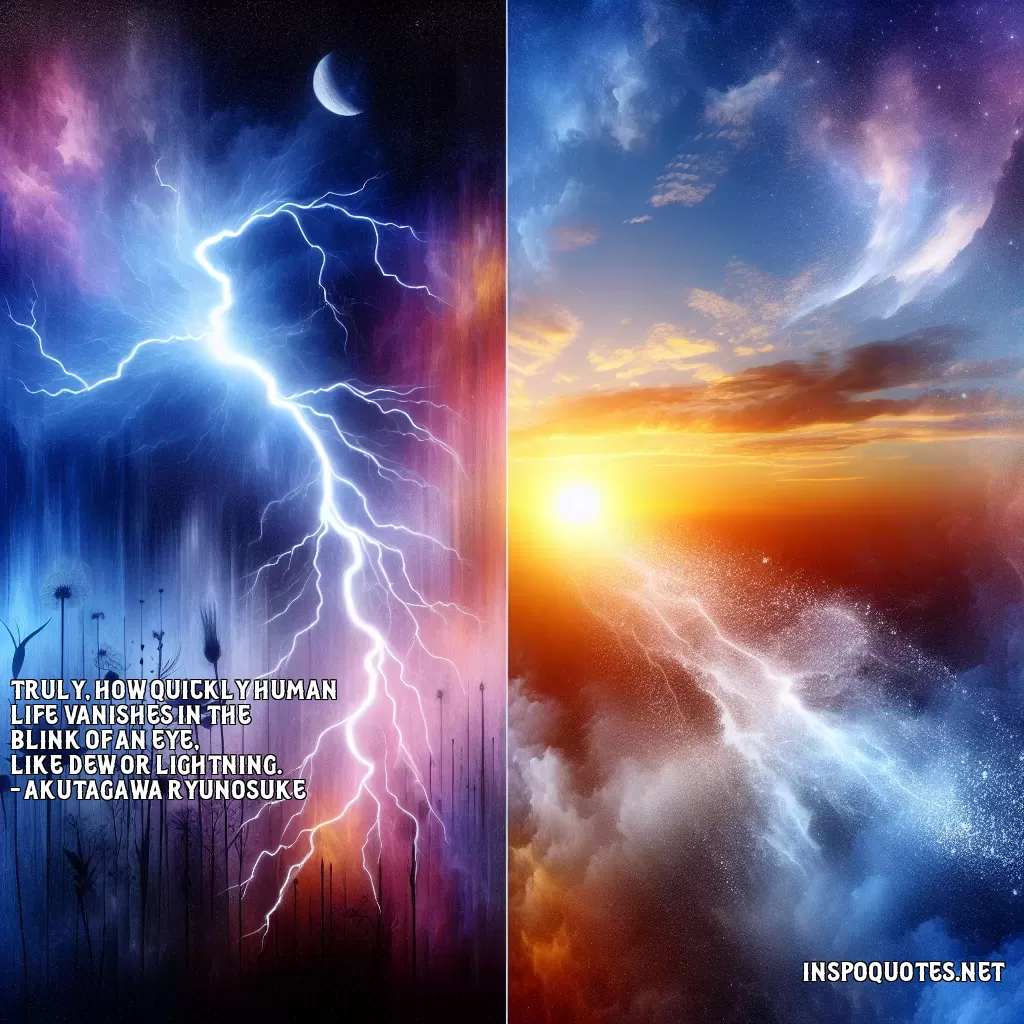
Truly, how quickly human life vanishes in the blink of an eye, like dew or lightning. - Akutagawa Ryunosuke
Author: Akutagawa Ryunosuke
👁️ 7 views

Truly, how quickly human life vanishes in the blink of an eye, like dew or lightning. - Akutagawa Ryunosuke
👁️ 7 views
The quote by Akutagawa Ryunosuke, "Truly, how quickly human life vanishes in the blink of an eye, like dew or lightning," captures the ephemeral nature of human existence. Akutagawa uses vivid and natural imagery to convey how fleeting our time on earth truly is. The comparison to "dew" suggests the delicate and temporary presence of life. Dew appears in the early morning, sparkling and fresh, only to disappear with the rising sun as it evaporates. Similarly, human life can seem strong and vibrant, yet is ultimately transient and limited. On the other hand, the analogy to "lightning" emphasizes the suddenness and unpredictability of life's end. Lightning is bright and powerful, yet it lasts only for a mere instant, highlighting the idea that our lives can change or conclude without warning. Similarly, one moment we are alive, filled with potential and activity, and the next instant, we may be gone. Through this quote, Akutagawa reflects on the impermanent, evanescent nature of life, urging us perhaps to appreciate each moment and live consciously. It serves as a reminder to embrace the present, recognizing that our existence is brief and precious. By contemplating the swift passage of time, we are encouraged to find meaning and value in our daily lives, cherishing the fleeting moments we have.
Quote By: Akutagawa Ryunosuke
He graduated from the prestigious University of Tokyo, where he studied English literature. Akutagawa began his writing career in the early 1910s, publishing his first story, "Rashomon," in 1915. This story, which narrates a crime from multiple conflicting perspectives, reflects Akutagawa's fascination with the elusiveness of truth and the subjective nature of reality. His unique narrative style, characterized by psychological depth and intricate storytelling, quickly garnered attention.
One of his most celebrated works, "In a Grove" (1922), showcases Akutagawa's innovative approach to narrative structure and character development. The story also served as the basis for Akira Kurosawa's acclaimed film "Rashomon," which further solidified Akutagawa's place in the global literary tradition. Throughout his career, he published numerous short stories, essays, and critiques, with notable works including "The Nose," "Hell Screen," and "Kappa."
Despite his literary success, Akutagawa struggled with personal issues, including depression and anxiety. These struggles often found their way into his writing, resulting in profound and sometimes dark reflections on life and the human condition. In 1927, at the age of 35, he tragically took his own life, a loss that shocked the literary community in Japan and beyond.
Akutagawa’s legacy endures, as he is regarded as a pioneering figure in Japanese literature. His ability to weave intricate psychological narratives continues to influence writers today, and his works remain essential reading in understanding modern Japanese literature and its exploration of the human psyche. His influence is particularly felt in the genre of short fiction, where his innovative techniques and thematic concerns resonate with contemporary writers around the world.